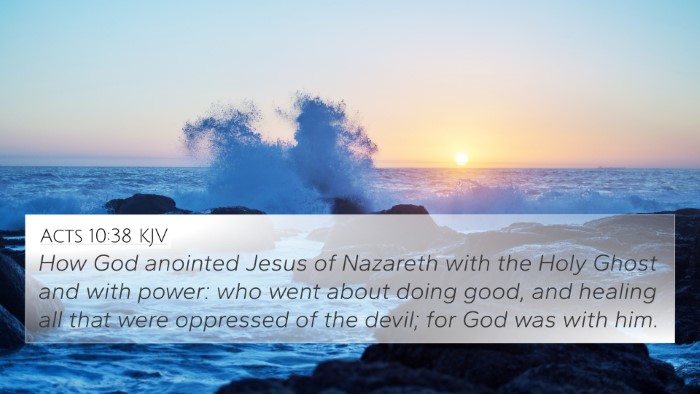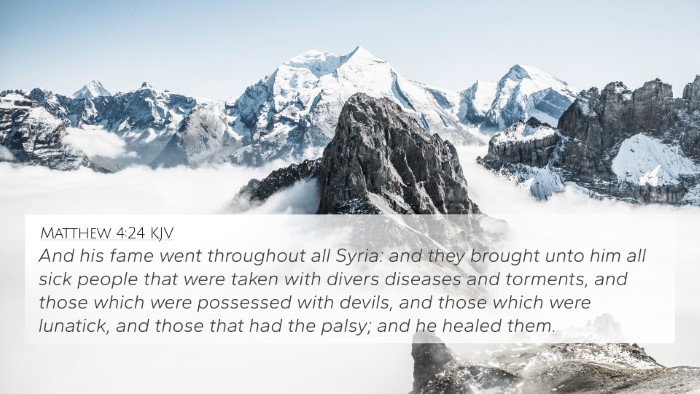Understanding Matthew 8:28
Verse: "And when he was come to the other side into the country of the Gergesenes, there met him two possessed with devils, coming out of the tombs, exceeding fierce, so that no man might pass by that way." (Matthew 8:28)
Summary of Meaning
Matthew 8:28 recounts a pivotal moment in Jesus' ministry, highlighting His divine authority over demonic forces. This verse illustrates the encounter between Jesus and two demon-possessed individuals, emphasizing the spiritual struggle and the fierce nature of their possession. The location, the country of the Gergesenes, also holds significance, marking a territory with both Jewish and Gentile influences, thus underscoring the universal scope of Jesus' mission.
Insights from Public Domain Commentaries
-
Matthew Henry:
Henry emphasizes the supernatural aspect of this passage, noting that the presence of these two individuals possessed with devils symbolizes the depth of human depravity. He also discusses how their fierce nature made them a notable presence, suggesting that their torment reflects the destructive power of sin.
-
Albert Barnes:
Barnes remarks on the geographical context in which this event occurs, arguing that it showcases the diverse audiences Jesus aimed to reach. He also interprets the ferocity of the possessed as a metaphor for the struggle of humanity under Satan's dominion.
-
Adam Clarke:
Clarke provides a focus on the historical-cultural setting, explaining that the region of the Gergesenes was marked by a mix of populations, which adds to the complexity of the narrative. He explains how this account not only points to Jesus' power but also His mission to liberate individuals regardless of their background.
Thematic Connections
This passage can be viewed through various lenses, linking it to broader themes in Scripture, such as:
- The struggle between good and evil (Ephesians 6:12)
- God's power over darkness (1 John 4:4)
- The transformative nature of faith (Mark 5:1-20)
- Jesus’ authority over evil spirits (Luke 8:26-39)
- The call to reach all nations (Matthew 28:19-20)
Cross-References in the Bible
- Mark 5:1-20: Another account of Jesus healing a demoniac.
- Luke 8:26-39: Parallel account with additional details about the healing.
- Matthew 12:43-45: Jesus discusses the nature of unclean spirits.
- James 2:19: The acknowledgment of God’s existence by demons.
- 1 John 5:18: Assurance of protection from the evil one.
- Revelation 21:8: The fate of the fearful and unbelieving.
- Acts 19:15: Eloquent demonstration of Jesus’ name over evil spirits.
- Romans 6:14: Sin shall not have dominion over those in Christ.
- Colossians 1:13: Delivered from the power of darkness.
- John 10:10: The thief comes to steal, kill, and destroy; Jesus comes to give life.
Applying the Insights
Understanding Matthew 8:28 is essential for grasping the overarching narrative of Jesus' ministry. The events illustrated in this verse serve to confirm the authority of Christ over evil and His ability to bring change into the lives of those who are troubled. It encourages believers to trust in that authority, knowing that Christ came to liberate and transform.
Tools for Deeper Study
For those seeking further insights into the connections within Scripture, consider utilizing:
- Bible Concordance: A resource for finding key terms and their occurrences throughout the Bible.
- Bible Cross-Reference Guide: Guides that provide links between various passages that share common themes.
- Cross-Reference Bible Study: Explore how various texts relate to one another and enrich understanding.
Conclusion
Matthew 8:28 serves as a testament to the authority of Jesus and His power over evil. By studying this verse and its connections, believers can appreciate the profound themes of redemption and spiritual warfare found throughout the Scriptures. Such understanding is essential for deeper faith and effectiveness in ministry.
Keywords used: Bible verse cross-references, Connections between Bible verses, Linking Bible scriptures, Comparative Bible verse analysis, Bible verses that relate to each other, Cross-referencing Biblical texts, Thematic Bible verse connections, Bible verse parallels, Scriptural cross-referencing, Inter-Biblical dialogue.










